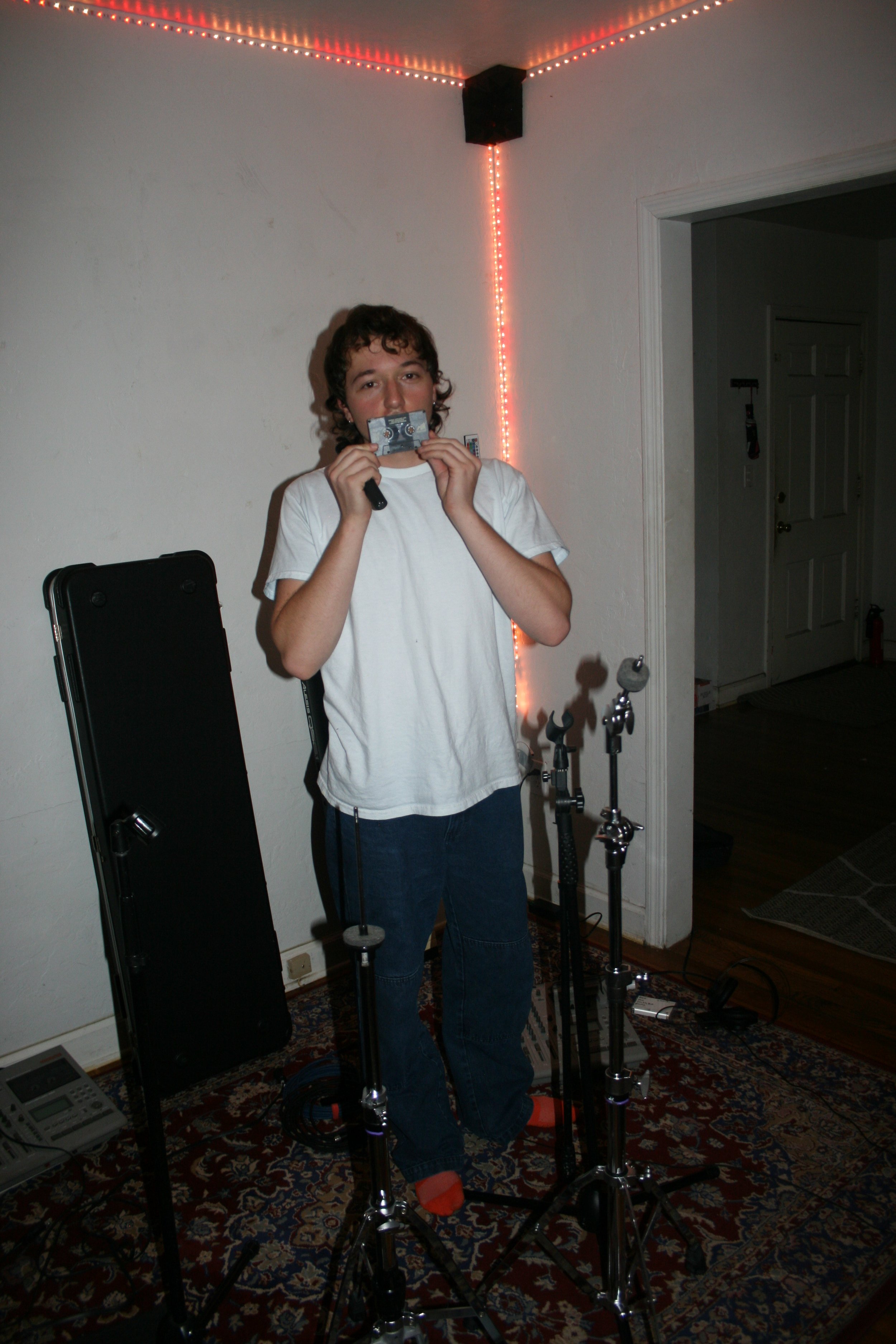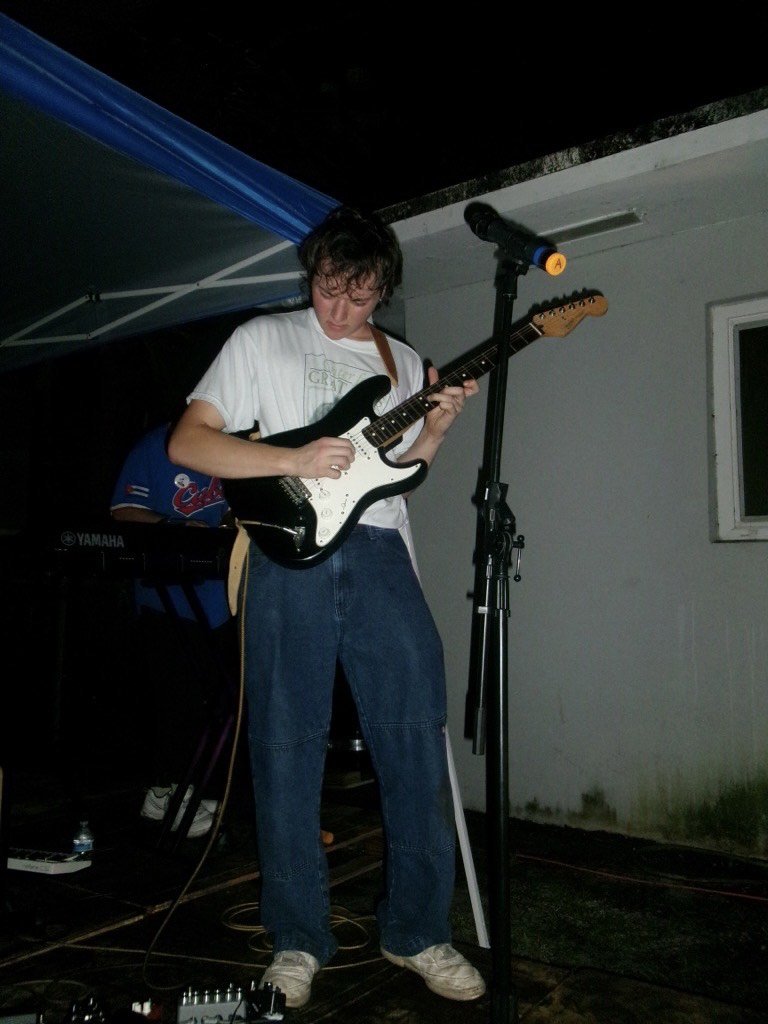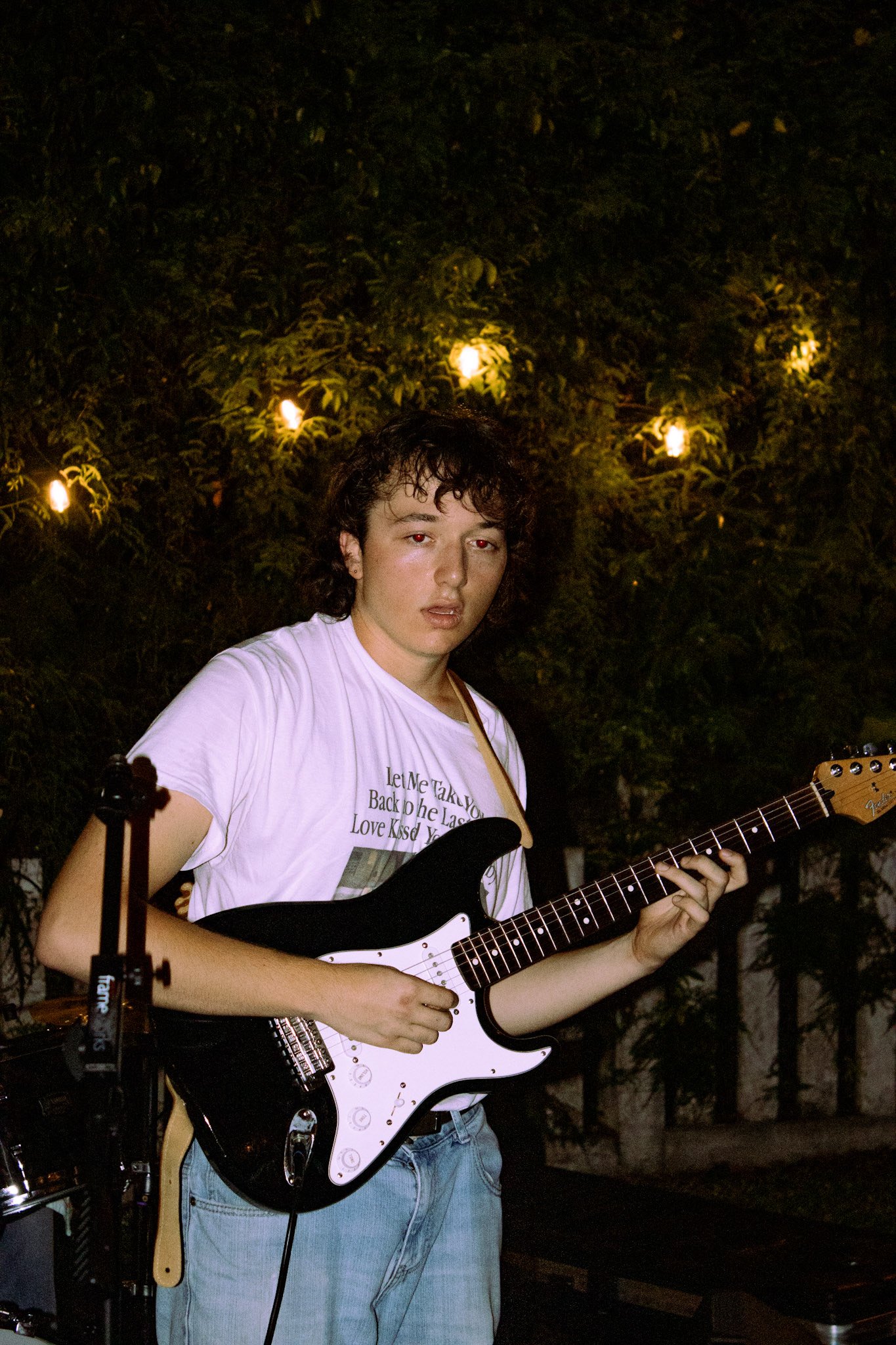An Interview With…
Nate Neuwirth (Nuclear Monkey)
Nate Neuwirth is a 20 year old artist from Richmond, Virginia creating vibey, memorable tracks with his band, Nuclear Monkey. Neuwirth has been writing music since high school, and united with like-minded jazz artists during his freshman year of college to bring the songs of his youth to life.
Read our conversation below, minus the Zoom call house tour we did, which was pretty awesome. This dude owns a lot of instruments.
Dylan: What was the music scene like where you grew up?
Nate: It's a lot of punk. I was never really a part of it. There’s also a lot of dad bands, but you'll find that in any city. I never really broke into the music scene in Richmond, to be honest, I kind of waited to do that until I got to Miami.
Dylan: What’s the music scene like in Miami?
Nate: It's a lot more like indie rock, I'd describe it as a very distinct sound, like South Florida indie rock. I don't know if you've heard of the band Mustard Service, they’re the biggest South Florida band. It fits a lot better [than Richmond] with Nuclear Monkey, though. So that's good.
Dylan: Has being out in Miami influenced your sound at all?
Nate: I never really played my original music until I got to Miami. I had also never thought about playing the music that I was writing live until I got to Miami, so hearing other bands [here] expanded my view of what people were doing in general. It was helpful in trying to be different. If I would go to a show and hear a lot of the same kind of guitar tone or somethin, I would be like maybe I would have done that if I hadn't heard them, but now I just heard all these people using it. I'm gonna try and make something a little different.
Dylan: What year are you in college and what’re you studying?
Nate: I'm a junior at U.M, University of Miami. I was majoring in jazz guitar performance, and then I switched to a music industry major, and now I'm doing a certificate in jazz guitar performance, which is just a little more than a minor.
Dylan: How did you and your band meet?
Nate: My drummer Tyler was my roommate. We were randomly assigned roommates, and we just ended up getting room together. He was the one who convinced me to play Nuclear Monkey live, because I had done the first album on my own with my friend David. He helped out in high school, but I was kind of just done with it at that point, because it was so much effort and I had no idea what I was doing. And I was like, “All right, that was it. That was me doing the music thing.” But Tyler was like, “Oh, this is awesome, you’ve got to play live.” So we got a bunch of other jazz performance students, piano and horns and bass. Everybody was a jazz student at Frost. The lineup has kind of changed, but everybody who's still in the band is at least, if they're not a jazz major, [pursuing a principal in] jazz. Everybody in the band met through there somehow.
Dylan: How did you get into creating your own music?
Nate: My parents had me taking lessons when I was, like six. And I liked recording covers because in high school I was very much a blues guitarist, classic rock fan. Like Jimmy Page, Eric Clapton, Jimi Hendrix and all that stuff. My favorite thing to do was just play that kind of guitar. So I got into recording my own loops where I could just do guitar solos for like five minutes. Then I started writing music my senior year, I had already been experimenting with recording, and it just kind of made sense. I also took a music production class my senior year, and that was a big help. I wrote some songs, and I was like, “These are really good. I need to make these. I need to release these at some level.”
Dylan: Your band has such a unique name. How did you come up with Nuclear Monkey?
Nate: That was my friend, David. We started together when we were juniors, we were both musicians, and wanted to make a band, and he already had the TikTok handle. Nuclear Monkey was already his account name, and I was like, “That's a great name, let's just call the band Nuclear Monkey, and then we already have the TikTok.” He just kind of came up with it on a whim, but I liked it, and I kind of appropriated it.
Dylan: What’s your sophomore album Hello Again about thematically?
Nate: The albums are always kind of a little snapshot into however I'm feeling or thinking at the time that I wrote all of it. What Wild Ecstasy was very much high school for me, and specifically interpersonal relationships I had during high school. Hello Again would be my first year of college. Lyrically, there's a lot less happening. There's a lot of songs like Caroline, My Heart Aches, More Than Ever, that are a little less serious. But there are songs like Deliver and Outlaw that’re very personal. I guess [Hello Again] is kind of an expansion on the first album. A lot of the things that I wrote about are the same, but I think that some of the songs are just much more mature, or maybe like, a deeper look into the same things I was writing about on the first one.
Dylan: I noticed that you open and close both of your albums with an instrumental track. Why is that?
Nate: I got that from Mild High Club I think. They do that a lot, King Gizzard [also] did that a lot. I really like King Gizzard. The idea of starting something and ending it in the same spot, like with the reprise. makes it feel very complete. Like The Wall, by Pink Floyd feels like the two ends of the book cover. I don't know if I'm gonna do it again, though. Now that you've mentioned it though, I might. I feel like I can.
Dylan: I'm gonna be bummed if you leave out the instrumentals
Nate: Well, I'm working on album three. Sometimes I get this feeling that the instrumentals are kind of like filler. I feel like I'm being kind of lazy when I put them in. but now I think I should have the opener and the closer.
Dylan: What’s your writing process like?
Nate: It's very personal, and it feels very out of my control most of the time. I'll sit at the guitar or the piano, and I'll write chords, and then either the song will come out or it doesn't. When I'm making a song, I need a melody. I feel like I can make a cool chord progression, but the hard part is having a good melody. If I can’t, then I ditch the song completely. But when I do write something, I feel like it all just kind of comes together all at once. More Than Ever is a good example. I did the video where I was just playing the piano and I had the melody and everything was very clear as to how the song needs to sound like, the drums and the vibe, all just came together in a moment. And if it doesn't, then it never comes together at all.
Dylan: What are your major inspirations?
Nate: From the beginning, it was a lot of Mac Demarco and Mild High Club too. I love Steely Dan. When I was 17, I was really obsessed with trying to make pop music that had a jazz influence, basically just big chords with more notes. Lately, I've been leaning a little bit more into Alex G, Mk.gee, some of my older influences, Neil Young, Bob Dylan, folkier stuff. Recently, I'm really fixated on the lo-fi, home recording scene, like Ariel Pink and Todd Rundgren.
Dylan: What do you think is the defining difference between your first and second album?
Nate: Hmm. I think that Hello Again is a little less of an experimentation and more of an intentional effort, because, [for] What Wild Ecstasy I started with two songs, and I was like, okay, cool. I'm gonna release a two sided single. Then, as I was recording them, I wrote another one, and then as I recorded that, I wrote another one, and then it turned into an album. Each song was very, very different, and kind of like a ground up process. And Hello Again was very much like me trying to make these all very coherent and flow into each other. When I made What Wild Ecstasy I was trying to just record my music and see what happened. But Hello Again was very much intentional. It took so long to do that by the time it was out, I'd already moved on. In my head I find myself relating less and less to [those songs] and more so to what I'm writing now, which is going to be on album three. Not to take it away from Hello Again, but I think album three is going to be a mix of the two. Some of it's going to be an experiment, but it's going to be intentional at the same time.
Dylan: What’s your third album about?
Nate: It’s a lot more recent. I had a pretty eventful last few years of high school emotionally. College was a little more stable. But recently I’ve been able to draw a lot more inspiration from things that are new. The songs are a lot more mature. On Hello Again there were some songs where the lyrics were there to capture a vibe. More Than Ever was me trying to capture that 70’s lo-fi pop vibe. These new songs are more intentionally worded. I’m very proud of the lyricism. They’re all very different, I wanted to bring back the way I wrote and recorded the first album, where I’d write and record a song [one by one] until they were done, instead of writing [them all] and then recording them. That first album had a kind of magic quality to it that was almost unintentionally done that I wanted to bring back. So yeah, it’s kind of a combination of the two in that way. When I have an experience, I try to write about the way it makes me feel, rather than the actual event, because then anyone can relate it to their experiences. There’s a lot of heartbreak and other stuff like that.
Dylan: Do you find there's a hard balance between being an artist and also being your own content creator/promoter?
Nate: It sucks. I really hate doing it. When that Sorry reel blew up the first semester I realized I was working the band too much. I was taking every show we got offered. We played every weekend, and sometimes there weren’t a lot of people there. We weren't even getting paid, and it kind of sucked. Everyone got really tired, and they got tired of me, and I felt really bad about it. It's kind of just demoralizing. I was like, we're putting in all of this effort and nothing's really happening. And I felt like the whole time I was just kind of running away from the reality, which is that you need to be on social media. And I've thought about it since, and I know now if you want to make it as a musician, you need a connection. It could be a label or a manager, or just like another artist who is repping your music, or like vouching for you. But you need somebody who's got resources, who's going to give you their resources, and you either there's two ways to get it. You either already have it, like as a family member or a friend who's already in that world and can be that person for you, or you have to find it, and the only way to find it nowadays on social media. The struggle for me is like, I'm trying to make something that's visually appealing and auditorily appealing, but I'm refusing to do things like “POV this and this,” because I don't want people to not take my music seriously. I don't want it to be funny. I don't want Nuclear Monkey to be a funny thing. If you have a reel that's really funny and it blows up, all these people are liking it because they think it's funny, not because they like your music. And then if they follow you, they're following you because they think you're funny, not because they like your music. I don't want that for myself. [I’m] just trying to try to find a balance, like those reels that we posted, are a miracle. I feel like I've been trying to recreate those for nine or ten months now. They were great because they were just the music and that was it, and they did really well. I'm trying to showcase music without saying anything else about it, which is really hard and takes a lot of time and effort. You just gotta adapt.






